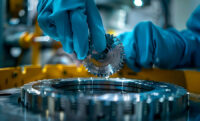Bassett CEO: 3 strategies drove Q2 return to profitability
Despite downward pressures stubbornly weighing on the industry, Bassett Furniture posted a return to profitability in the second quarter.
Emerson to lay off 87 workers in Charlottesville
Emerson Electric plans to lay off 87 workers at its Charlottesville manufacturing facility, starting Dec. 31.
Bassett CEO Rob Spilman talks tariff strategy, supply chain resilience
Henry County’s Bassett Furniture is taking a solutions-focused approach to protect profitability and support its dealer network amid uncertainty.
Acoustical Sheetmetal Co. to invest $46M in Virginia Beach expansion
Virginia Beach-based Acoustical Sheetmetal Co. will invest $45.8 million to expand its operations and create 350 jobs.
Hooker restructuring targets $25M savings by FY27
Hooker Furnishings launches restructuring to cut $25M in fixed costs by FY27, closing warehouses and expanding overseas operations for savings.
Fed’s Fifth District expands slightly amid uncertainty
The Fifth District economy saw mild growth, with mixed hiring, rising import costs, and steady consumer spending despite economic uncertainty.
Trump tells US steelworkers he’s going to double tariffs on foreign steel from 25% to 50%
WEST MIFFLIN, Pa. (AP) — President Donald Trump said Friday that he’s doubling the tariff rate on steel to 50%, a dramatic increase that could further push up prices for a metal used to make housing, autos and other goods. Trump spoke at U.S. Steel’s Mon Valley Works–Irvin Plant in West Mifflin, Pennsylvania, near Pittsburgh […]
EU regulators to decide on Mars-Kellanova merger in June
Antitrust regulators with the European Union have set a June 25 deadline to decide whether to approve McLean-based candymaker and pet care giant Mars' $35.9 billion acquisition of snack producer Kellanova, announced last August.
QualiChem to invest $9M in Salem expansion
Salem-based metalworking fluids manufacturer QualiChem will invest $9 million to expand its operations with a new 48,550 square-foot facility and will create 12 jobs, according to a May 13 announcement.
Vaughan-Bassett sees strong domestic demand despite China tariff easing
Doug Bassett, president of Galax-based Vaughan-Bassett Furniture, said the recent developments and the ongoing uncertainty around trade are having a positive impact on the company’s business because it lacks much direct exposure to China in their supply chain.
Virginia could lose 32,000 jobs in 2025, U.Va. estimates
Virginia may lose 32,000 jobs in 2025 amid federal cuts and rising unemployment, according to a new forecast by the University of Virginia’s Weldon Cooper Center for Public Service.
As US and China begin trade talks in Geneva, Trump’s tariff hammer looks less mighty than he claims
Trump raises China tariffs to 145%, sparking retaliation and global market jitters as trade talks begin in Geneva with no clear resolution in sight.






















